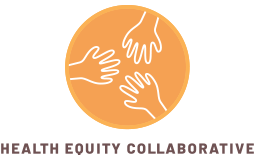11 Jun Pride Month: A Call to Advance Health Equity for LGBTQ+ Communities
Every June, communities across the country celebrate Pride Month — honoring the resilience, contributions, and humanity of LGBTQ+ individuals. But as rainbow flags fill public spaces, it’s critical to recognize that visibility alone does not equate to equity.
For millions of LGBTQ+ people in the United States, healthcare remains an environment of uncertainty — and often, exclusion.
Structural Change Is Essential. Not Optional.
Health equity for LGBTQ+ communities requires more than cultural awareness or annual observance. It demands intentional, systems-level change in policy, practice, and funding. This Pride Month, Health Equity Collaborative calls on policymakers, health systems, and stakeholders to take meaningful action in three key areas:
1. Protect and Expand Access to LGBTQ+-Inclusive and Gender-Affirming Care
Laws that restrict access to gender-affirming care are not only discriminatory, they are harmful to public health. Medical organizations, including the American Medical Association and the American Academy of Pediatrics, affirm that gender-affirming care is evidence-based, lifesaving, and essential.
Transgender individuals already face immense barriers to accessing appropriate care. Denials of hormone therapy, mental health support, and even basic preventive services are common. Policymakers must work to:
- Protect access to gender-affirming care across all states.
- Prevent discrimination based on sexual orientation or gender identity in public and private insurance.
- Ensure Medicaid and Medicare coverage includes necessary LGBTQ+ health services.
Gender-affirming care is not elective; it is essential.
2. Strengthen LGBTQ+ Cultural Competency Across the Healthcare Workforce
Despite growing awareness, many medical professionals are still not trained to meet the specific needs of LGBTQ+ patients. From intake forms that assume binary gender to providers unfamiliar with PrEP, hormone therapy, or LGBTQ+ mental health challenges, gaps in knowledge continue to compromise care.
LGBTQ+ cultural competency must be built into:
- Medical and nursing school curricula,
- Continuing education requirements,
- Institutional policies and hiring practices.
Training should go beyond basic terminology to include active strategies for building trust, reducing bias, and practicing affirming care. When providers are prepared, LGBTQ+ patients are more likely to seek care, disclose essential health information, and receive timely, effective treatment.
3. Advance Vaccine Equity for LGBTQ+ Communities
Vaccines are a critical tool in protecting public health, especially for the LGBTQ+ community, but they must be distributed and delivered equitably. LGBTQ+ communities, particularly those at the intersection of other marginalized identities, often face unique barriers to accessing vaccines, including stigma, misinformation, and a lack of targeted outreach.
To prevent future disparities, vaccine access must be reimagined with equity at the center. This includes:
- Partner with LGBTQ+ organizations to lead outreach and vaccine delivery.
- Emphasize the importance of collecting data from the LGBTQ+ community to identify and address vaccination gaps.
From COVID-19, to mpox, to HPV, LGBTQ+ communities must be seen, not only in risk profiles, but in response strategies. Equity in vaccination is not just about supply; it’s about trust, accessibility, and inclusion.
Pride Is Both a Celebration and a Responsibility
Pride Month honors generations of LGBTQ+ advocates who fought for dignity, justice, and survival, many of whom were excluded from the very systems meant to protect public health. Today, we have an opportunity and a responsibility to continue that legacy by making healthcare truly inclusive, equitable, and affirming.
At Health Equity Collaborative, we believe that LGBTQ+ health equity is not a side issue. It is central to achieving a just and healthy society for all.
Further Resources for LGBTQ+:
-
- The Trevor Project: Provides crisis intervention and suicide prevention services to LGBTQ+ youth.
- GLAAD: Promotes understanding, increases acceptance, and advances equality for LGBTQ+ individuals.
- Human Rights Campaign (HRC): Advocates for LGBTQ+ equality and provides resources on various issues impacting the LGBTQ+ community.
- National Center for Transgender Equality (NCTE): Advocates for change in policies and society to increase understanding and acceptance of transgender people.
- Fenway Health: Offers healthcare services, research, education, and advocacy for the LGBTQ+ community.
- PFLAG: Provides support, education, and advocacy for LGBTQ+ people, their families, and allies.
- Centers for Disease Control and Prevention (CDC) – LGBT Health: Offers information and resources on health issues affecting LGBTQ+ populations.
- GLMA – Health Professionals Advancing LGBTQ Equality: Provides a directory of LGBTQ+ friendly healthcare providers.


